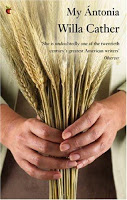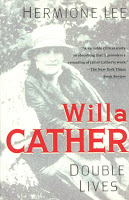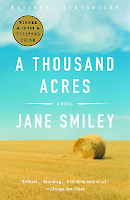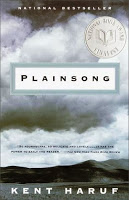Published in 1918 My Antonia (M) by Willa Cather is considered to be one of her best novels. If you, like me, grew up devouring books by Laura Ingalls Wilder (M), you will certainly appreciate My Antonia. Narrator, Jim Burden, travels to Black Hawk, Nebraska following the death of his parents to live with his grandparents. His grandparents are comfortable, prosperous farmers who provide him with a stable and loving home. Their neighbours were largely recent immigrants from Scandinavian and Eastern European countries who were struggling with language and with basic survival. One neighbouring family, the Shimerdas and their daughter Antonia, fascinate young Jim and become the focus of the story. Over the course of five books (or chapters) we read about the progress of Antonia’s life. We see her as a young girl, strong and smart and proud to work as hard has her brother. As a young woman she goes out and work as a hired girl and sends all her money home to her family. She struggles with responsibility and the desire to be young and free. Perhaps the most touching book is the final one where we see Antonia as the mother of a large family. Despite the unhappiness in her life, she ends up surrounded by a loving family who appreciate her strength.
 This is a relatively small book that deals with so many big ideas. Overall it is a reflective read that focuses on the inner emotions of the characters as well as evoking a strong sense of place. The narrator, Jim, plays an inactive role as an academic and an observer. This is a book about women and their role in settling the American west. It’s also a story about the immigrant experience. Cather paints of picture of the struggle to learn a new language and to cope with unfamiliar foods and basically try to survive in a land where everything is strange. There are hints of the lives left behind filled with learning and music, given up for a promise of a prosperous future that might not pay off for a couple of generations. My Antonia reflects the idea of Manifest Destiny with the settlers’ moral right to expand across the continent relying on hard work, self-reliance and neighbourly support.
This is a relatively small book that deals with so many big ideas. Overall it is a reflective read that focuses on the inner emotions of the characters as well as evoking a strong sense of place. The narrator, Jim, plays an inactive role as an academic and an observer. This is a book about women and their role in settling the American west. It’s also a story about the immigrant experience. Cather paints of picture of the struggle to learn a new language and to cope with unfamiliar foods and basically try to survive in a land where everything is strange. There are hints of the lives left behind filled with learning and music, given up for a promise of a prosperous future that might not pay off for a couple of generations. My Antonia reflects the idea of Manifest Destiny with the settlers’ moral right to expand across the continent relying on hard work, self-reliance and neighbourly support. Willa Cather was born in Nebraska and was acknowledged with a Pulitzer Prize in 1922 for One of Ours (M). You can read more about her fascinating life in Hermione Lee’s Willa Cather: double lives (M).
Willa Cather was born in Nebraska and was acknowledged with a Pulitzer Prize in 1922 for One of Ours (M). You can read more about her fascinating life in Hermione Lee’s Willa Cather: double lives (M).
If you enjoy character driven novels with evocative descriptions of natural landscapes you might also enjoy A Thousand Acres (M) by Jane Smiley and Plainsong (M) by Kent Haruf. “A successful Iowa farmer decides to divide his farm between his three daughters. When the youngest objects, she is cut out of his will. This sets off a chain of events that brings dark truths to light and explodes long-suppressed emotions. An ambitious reimagining of Shakespeare’s King Lear cast upon a typical American community in the late twentieth century, A Thousand Acres takes on themes of truth, justice, love, and pride, and reveals the beautiful yet treacherous topography of humanity.” publisher
“A successful Iowa farmer decides to divide his farm between his three daughters. When the youngest objects, she is cut out of his will. This sets off a chain of events that brings dark truths to light and explodes long-suppressed emotions. An ambitious reimagining of Shakespeare’s King Lear cast upon a typical American community in the late twentieth century, A Thousand Acres takes on themes of truth, justice, love, and pride, and reveals the beautiful yet treacherous topography of humanity.” publisher “A heartstrong story of family and romance, tribulation and tenacity, set on the High Plains east of Denver. In the small town of Holt, Colorado, a high school teacher is confronted with raising his two boys alone after their mother retreats first to the bedroom, then altogether. A teenage girl — her father long since disappeared, her mother unwilling to have her in the house — is pregnant, alone herself, with nowhere to go. And out in the country, two brothers, elderly bachelors, work the family homestead, the only world they’ve ever known. From these unsettled lives emerges a vision of life, and of the town and landscape that bind them together — their fates somehow overcoming the powerful circumstances of place and station, their confusion, curiosity, dignity and humor intact and resonant. As the milieu widens to embrace fully four generations, Kent Haruf displays an emotional and aesthetic authority to rival the past masters of a classic American tradition. Utterly true to the rhythms and patterns of life, Plainsong is a novel to care about, believe in, and learn from.” Discover
“A heartstrong story of family and romance, tribulation and tenacity, set on the High Plains east of Denver. In the small town of Holt, Colorado, a high school teacher is confronted with raising his two boys alone after their mother retreats first to the bedroom, then altogether. A teenage girl — her father long since disappeared, her mother unwilling to have her in the house — is pregnant, alone herself, with nowhere to go. And out in the country, two brothers, elderly bachelors, work the family homestead, the only world they’ve ever known. From these unsettled lives emerges a vision of life, and of the town and landscape that bind them together — their fates somehow overcoming the powerful circumstances of place and station, their confusion, curiosity, dignity and humor intact and resonant. As the milieu widens to embrace fully four generations, Kent Haruf displays an emotional and aesthetic authority to rival the past masters of a classic American tradition. Utterly true to the rhythms and patterns of life, Plainsong is a novel to care about, believe in, and learn from.” Discover
Source: http://www.thereader.ca/2012/01/staff-pick-my-antonia-by-willa-cather.html



